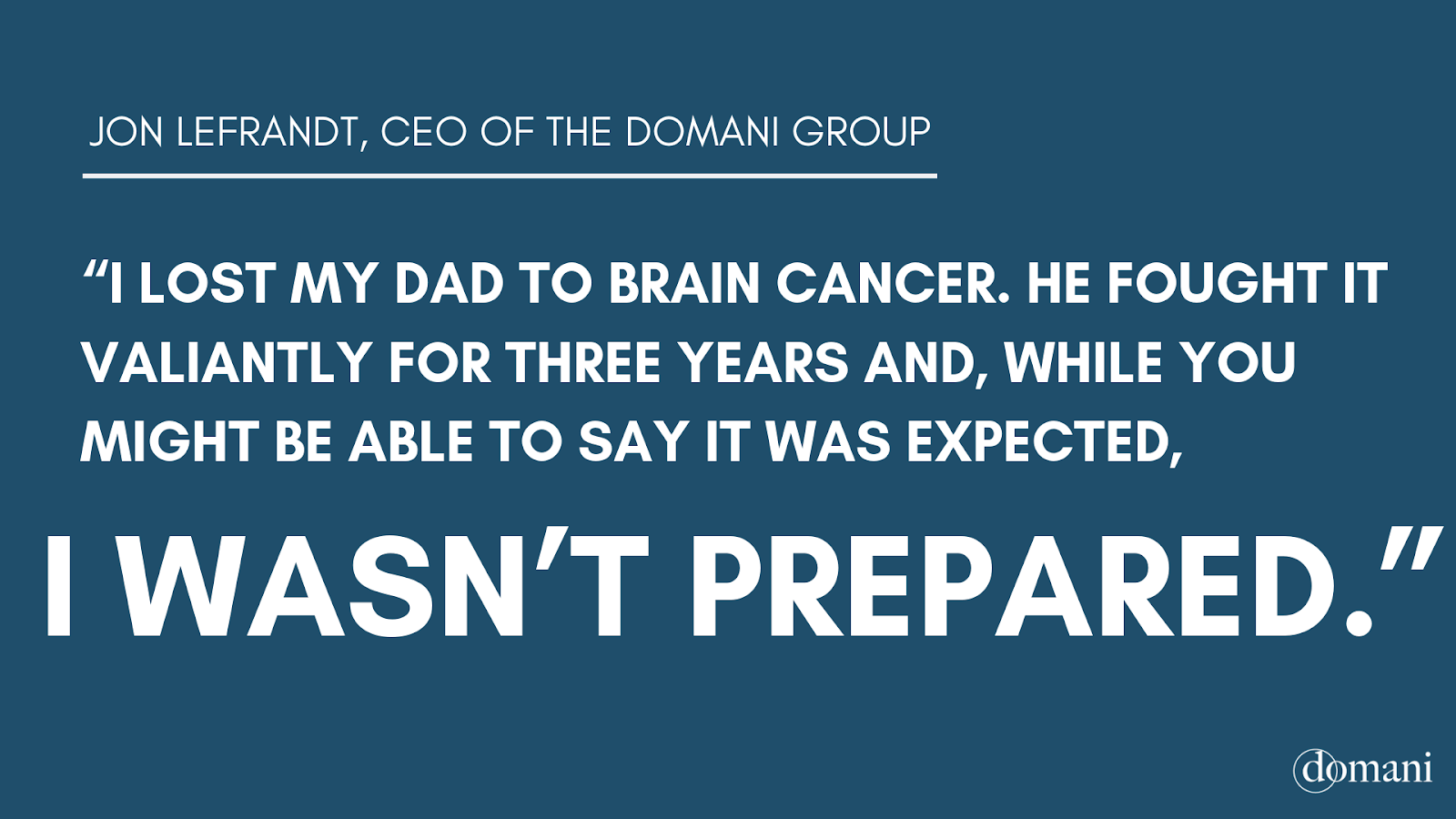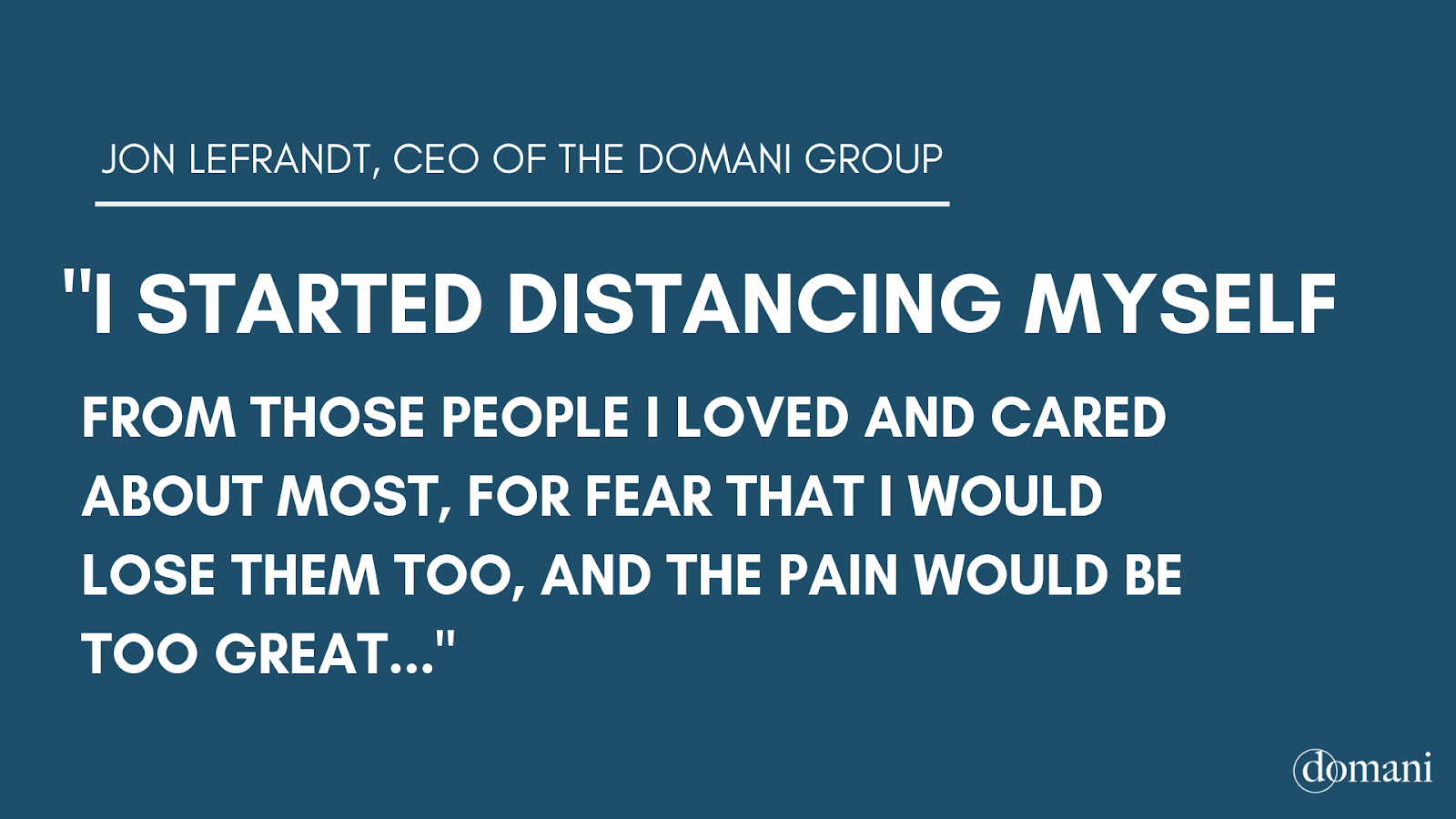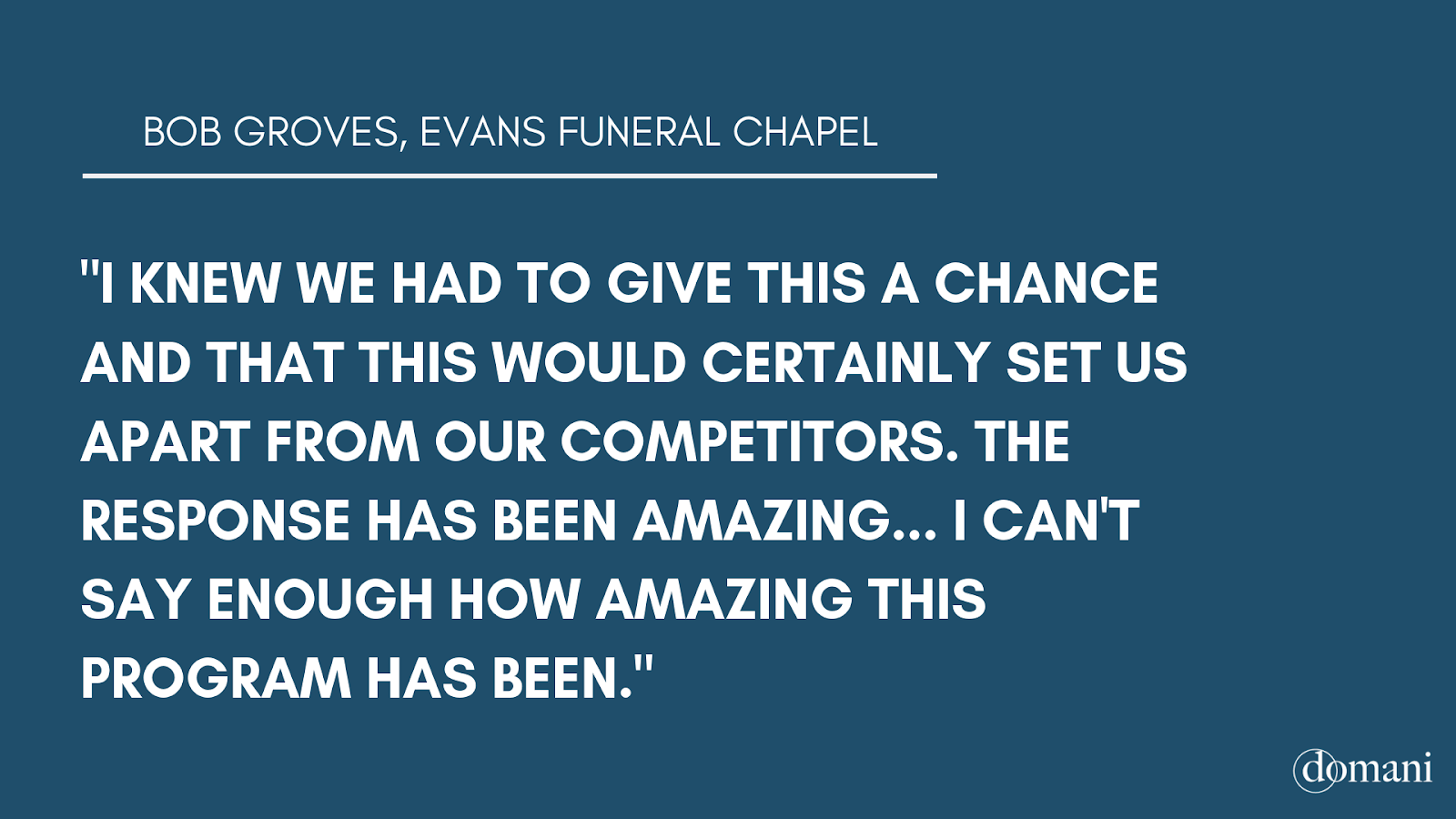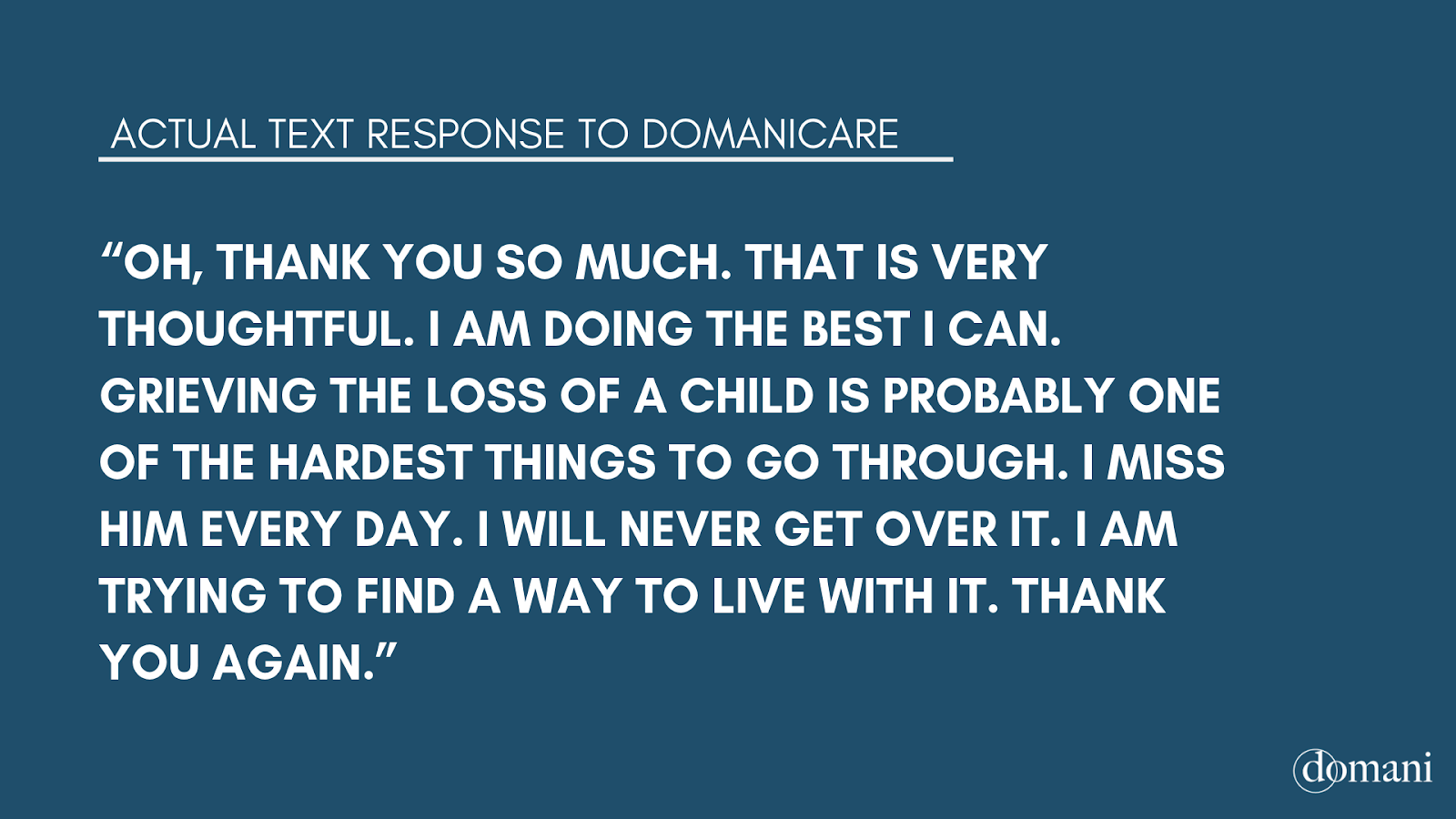Jon Lefrandt's Grief Story Is Reshaping an Entire Industry
Chad Zollinger • June 14, 2019
The weeks after a funeral are some of the loneliest that families can experience, even when surrounded by friends.
Until recently, the funeral profession had not found an effective aftercare solution to one enormous problem: the ever-widening emotional gap between funeral homes and their families after the funeral services.
Yes, there are decent funeral aftercare services.
But, traditional aftercare has still been too impersonal and too disconnected. After all, at-need families are the highest priority for a funeral home.
Either personal, compassionate communication is too difficult to manage long-term or quality grief therapy is too expensive to provide — these are the problems that Domanicare has solved.
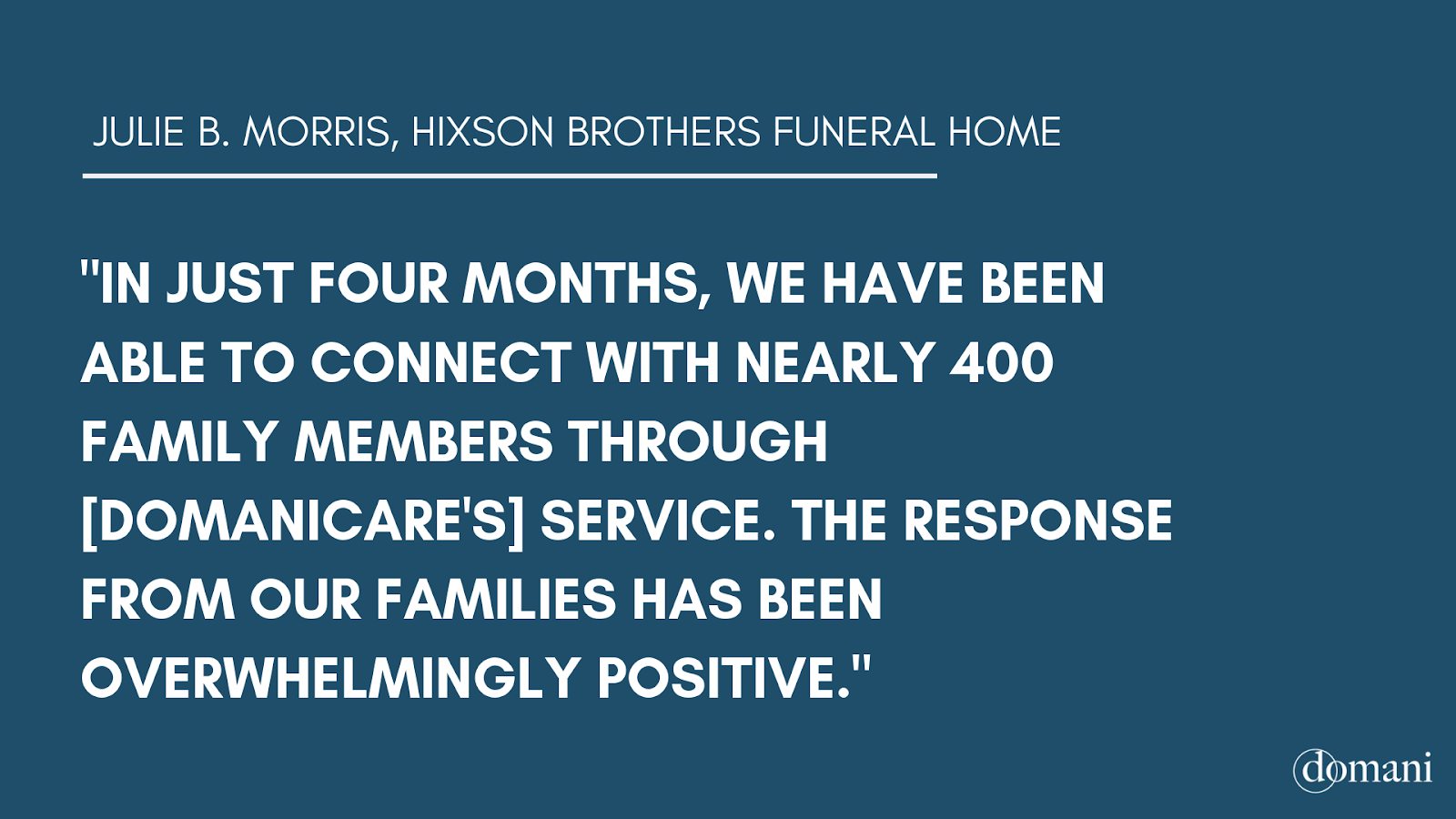
Funeral directors have begun creating customized, in-house aftercare services. These can be difficult to manage, expensive, and time-consuming.
So what makes Domanicare any different from the other aftercare services out there? Why is Domanicare successful
when so many other programs miss the mark?
The answer is in our story.
Jon Lefrandt's Grief Story
Jon Lefrandt, like many others, has walked the lonely path of grief.
As the Co-Founder and CEO of Domanicare, his grief story has shaped his life, his company, and has already begun reshaping the funeral aftercare industry as a whole.
As the oldest of seven children, Jon stepped in to help his mother and younger siblings when his father passed away.
The burden of grief was amplified by the task of planning his father’s funeral along with the responsibility he had to his own young family.
On top of it all, Jon had never planned a funeral before.
He didn’t know how to balance the trauma of losing a parent, the financial obligations of a funeral, and the final wishes of his father.
He figured that, as he had done with most things in life, he could just grind out the work and eventually the grief would pass with time — he thought he could simply move on with life.
He was wrong.
Jon loved his family, gained support from friends, and found comfort in faith, but there was a problem: in ignoring his grief, Jon was distancing himself from those around him.
Five long years passed and his grief remained.
Jon thought “it was better to not have any connection at all, then to go through this experience again… It wreaked havoc on my life and my emotional wellbeing.”
Eventually, Jon’s wife convinced him that he needed additional help.
With the professional help of trained therapists, he was able to come to terms with the grief of losing his father — he went from ignoring the grief to accepting it.
Over time, Jon realized that there were certain negative experiences in his grief story that could have been prevented.
Domanicare was partly created to eliminate harmful experiences in grief and provide a clear path to wellness for aftercare families.
Jon’s personal grief experience is what gives Domanicare the insight and power to succeed.
Domanicare: Personal, Innovative, and Effective Funeral Aftercare
So, what exactly does Domanicare do?
Domanicare includes four vital funeral aftercare services that resolve negative experiences for aftercare families:
- Text-Message Based Aftercare
- Online Grief Support
- Review Generation
- Pathways Appointment Setting
Through our text-messaging based aftercare, funeral homes are able to get in touch with a large number of families in a personal way and much quicker than traditional aftercare communication methods.
Domani for Grief & Loss
is our online grief support that includes free grief courses from trained therapists, 24/7 grief coaching, in-person therapy sessions with trained, Domani-certified therapists, and supplemental grief support content.
We also provide review generation, which helps amplify the visibility of the most quality funeral homes. This helps families who’ve just lost a loved one find the best funeral home in at-need situations.
Our pathways appointment setting service connects or reconnects aftercare families to preneed counselors if the family is interested in preplanning their funerals. Funeral homes may desire simply to follow-up with the family or provide additional support.
Why Domanicare Matters
There are 13 million grievers annually due to death in the United States alone.
(Grief Dialogues)
There are 13 million sons, daughters, brothers, sisters, fathers, and mothers that are grieving the loss of a loved one each year.
Grief doesn’t just hurt for a while — it can be lifelong and be the catalyst to more serious consequences.
Unresolved grief can lead to drug addiction. It can infect and ruin healthy relationships. It can tear families apart.
The relief of accepting and coping with grief will likely never be as intense as the pain of loss itself, but it does provide space for happiness once again.
When a funeral home, hospice, or care facility provides an aftercare program that effectively addresses the unendurable pain of grief, the gratitude from aftercare families is staggering to witness.
Domanicare isn’t a hollow pitch or a marketing scheme.
It isn’t just a new service for funeral homes and hospices.
It isn’t just a successful new company.
Domanicare really is an empathetic service created from one man’s grief story.
And it really is reshaping the aftercare industry.
Funeral Home Articles

If there's one thing we've learned in 2020, it's that it's difficult to predict the future, and there will all be surprises that lie ahead. Businesses and individuals need to stay agile and adaptable to be ready for whatever life throws at them. 2020 has been a challenging year for the funeral profession and others as well. Still, we've seen that those funeral homes and funeral professionals who have focused on making their consumer experience as comforting and easy as possible are those that are winning. At Domani, we exist to help funeral homes help their families have a better experience. Through the power of text messaging, we follow up with families and give them the support and resources they need following a loss. That great experience then leads to a positive online review and helps others looking for a positive experience to find that funeral home. It's a virtuous cycle that helps grow a funeral home's at-need business. When it comes to preneed, the same principle holds. If funeral homes can provide the experience a family is looking for, that will be the funeral home that wins. During 2020, our preneed appointment setting team has found great success in scheduling remote appointments. Funeral homes that have been willing to adapt and find new ways to do business have grown even during difficult circumstances. We firmly believe that technology will help us as a funeral profession provide those better experiences for families, but simply using technology for technology's sake is not the answer. We need to leverage technology to help provide personal, engaging experiences with families. We shouldn't use technology as a crutch or an excuse. It's another way to help the ones we serve and provide them the support they need during a difficult time. As we approach the end of the year and look forward to 2020, take some time to think about how your funeral home is providing meaningful experiences for families and how/what you can do to improve that in the coming year. If you're interested in learning more about Domanicare or Domani Appoinment Setting, please schedule a demo by clicking the link below.

By far the most effective way to create a sense of loyalty to your funeral home is to perform an exceptional service for that family. However, there’s more that you can be doing to establish credibility with families. Here’s three easy steps on how to develop loyalty to your company and ensure your customers come back for your services when a loved one passes.

The vast majority of people in the US and Canada use smartphones. Almost everyone has a smartphone nowadays. Remember when the first “smartphone” came out in 1992 and cell phones like the BlackBerry and iPhone were considered luxuries when they were first created? Now it’s a common sight to see an iPhone. Most funeral homes and cemeteries haven’t even scratched the surface of text-based aftercare, but with 80% of the U.S. population owning a smartphone, and that number expected to rapidly grow.
